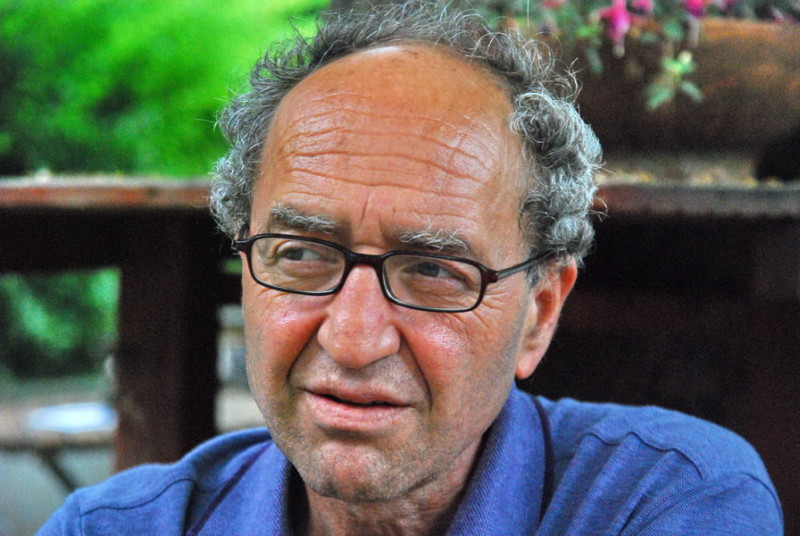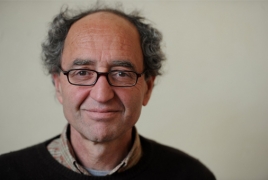
Urging Spain to Block his Extradition to Turkey Dogan Akhanli
#1

Posted 20 October 2012 - 09:15 AM
Gayane Arakelyan
hetq
14:41, October 19, 2012
Dogan Akhanlı, is a Turkish intellectual living in Berlin, who has
recognized and condemned the Armenian Genocide.
He has written a play entitled "A Mother's Silence" that tells the
story of a Turkish girl raised in Germany who one day notices the
tattoo of an Armenian cross on her mother's chest.
The play was performed yesterday at Berlin's Unterm Dach Theater to
a packed audience of Germans, Armenians and Turks.
"The Armenian Genocide is not past history that took place some 100
years ago. It is very real today and impacts our lives today. We must
change the people's mentality by talking about the issue. And I, as
a man of the theater, am trying to make my voice reach the people,"
notes Akhanlı.
#2

Posted 03 September 2017 - 03:12 PM

A Turkish-born German writer facing extradition from Spain to Turkey, which accuses him of “terrorism”, on Wednesday urged Madrid not to send him to a country that is “slipping towards fascism,” the Digital Journalreports.
Dogan Akhanli, who has lived in Germany since 1991, was arrested August 19 while on holiday in Granada in southern Spain, on the basis of an Interpol “red notice” from Turkey, in a case that has further strained German-Turkish relations.
Turkish authorities accuse the 60-year-old writer of “terrorism”, his lawyer Gonzalo Boye said.
Berlin protested and a Madrid court freed Akhanli on August 20 but ordered him to stay in Spain and report to the authorities weekly, while Turkey has 40 days to send a formal extradition request.
“How can they consider deporting me to Turkey, a country that is slipping towards fascism, when Spaniards themselves must have learned from history what this means for mankind,” he said at a Madrid news conference, referring to Franco dictatorship in Spain from 1939 to 1975.
Germany has dismissed the case against Akhanli as politically motivated, and Chancellor Angela Merkel warned President Recep Tayyip Erdogan’s government not to “misuse” Interpol to pursue its critics.
Akhanli said he believed Turkey ordered his arrest because “I express myself out loud, and because I write books about the Armenian genocide and the rights of the Kurds”, Turkey’s largest ethnic minority group.
Akhanli grew up in Istanbul, and was jailed from 1985 to 1987 in the aftermath of a military coup.
He emigrated to Germany in 1991, where he was granted political asylum, and in 2001 he became a German citizen.
On a return trip to Turkey in 2010 Akhanli was again arrested, accused of heading a terrorist organisation and having taken part in a deadly 1989 robbery.
After several months in detention, a court cleared him and he left Turkey, but the ruling was overturned in 2013.
Akhanli argues that the accusations against him are made up.
Any country can issue an Interpol “red notice”, roughly equivalent to an international arrest warrant, but extradition by Spain would follow only if Ankara can convince Spanish courts it has a solid case against him.
Boye, Akhanli’s lawyer, accused Spanish authorities of granting extraditions too easily.
He said that Madrid extradited three people to Turkey in 2014, three in 2015 and five in 2016.
“The numbers speak for themselves,” Boye said.
#3

Posted 21 September 2017 - 08:59 PM
 August 31, 2017 - 15:13 AMT
August 31, 2017 - 15:13 AMT
PanARMENIAN.Net - A Turkish-born German writer facing extradition from Spain to Turkey, which accuses him of "terrorism", on Wednesday, August 30 urged Madrid not to send him to a country that is "slipping towards fascism", AFP reports.
Dogan Akhanli is among the Turkish intellectuals who have recognized the Armenian Genocide.
Akhanli, who has lived in Germany since 1991, was arrested August 19 while on holiday in Granada in southern Spain, on the basis of an Interpol "red notice" from Turkey, in a case that has further strained German-Turkish relations.
Turkish authorities accuse the 60-year-old writer of "terrorism", his lawyer Gonzalo Boye said.
Berlin protested and a Madrid court freed Akhanli on August 20 but ordered him to stay in Spain and report to the authorities weekly, while Turkey has 40 days to send a formal extradition request.
"How can they consider deporting me to Turkey, a country that is slipping towards fascism, when Spaniards themselves must have learned from history what this means for mankind," he said at a Madrid news conference, referring to Franco dictatorship in Spain from 1939 to 1975.
Germany has dismissed the case against Akhanli as politically motivated, and Chancellor Angela Merkel warned President Recep Tayyip Erdogan's government not to "misuse" Interpol to pursue its critics.
Akhanli said he believed Turkey ordered his arrest because "I express myself out loud, and because I write books about the Armenian genocide and the rights of the Kurds", Turkey's largest ethnic minority group.
#4

Posted 15 October 2017 - 10:38 AM
Agence France Presse
October 13, 2017 Friday
Spain refuses to extradite author to Turkey
Madrid, Oct 13 2017
Spain said Friday it would not extradite a German-Turkish author
accused by Turkey of "terrorism", weeks after freeing a journalist
wanted by Ankara.
"The government has decided against proceeding with the extradition of
Dogan Akhanli as called for by Turkey," Spanish Deputy Prime Minister
Soraya Saenz de Santamaria said.
Reacting to Spain's decision, the author told German daily Kolner
Stadt Anzeiger: "I'm very relieved. This is what I've been waiting
for."
Akhanli, 60, has lived in Germany since 1991. He was arrested in
August while on holiday in southern Spain following an Interpol
warrant initiated by Ankara accusing him of "terrorism", his lawyer
said.
After Berlin objected, Akhlani was released but instructed to remain
in Spain until a decision was made on his extradition.
He says Turkey wants to arrest him for his books on the mass killings
of Armenians during World War I and the rights of Turkey's Kurdish
minority.
Akhlani's arrest followed the detention of journalist Hamza Yalcin by
Spanish police on a Turkish warrant on charges of insulting President
Recep Tayyip Erdogan and of having links to an unspecified "terror
group".
The joint Swedish-Turkish national was freed last month and Spain said
he would not be extradited to Turkey due to his refugee status in
Sweden.
Turkey ranks 155 on Reporters Without Borders' latest press freedom
index, below Belarus and the Democratic Republic of Congo, after
dropping four places from its 2016 ranking
av-akf/pmr/pg/pvh
- MosJan likes this
#5

Posted 07 November 2021 - 07:58 AM
Rest in Peace!
Armenian Mirror Spectator
Nov. 4, 2021
Dogan Akhanli, Obituary Article
BERLIN (Combined Sources) — Dogan Akhanli, a fighter for human rights
in Turkey and worldwide, and an active proponent of the recognition of
the Armenian Genocide died on October 31 from lung cancer. He was 64.
In 2018, he was awarded the European Tolerance Prize for Democracy and
Human Rights. In 2019, he received the Goethe Medal of the
Goethe-Institut for his courage to “assert himself with artistic and
journalistic works against political, religious or social resistance”,
as the laudatory speech states.
Akhanli was born in 1957 in southeastern Turkey, in the province of
Artvin near the Georgian border. At the age of 12, he was sent to a
school in Istanbul. He studied history and pedagogy, became
politically active and later joined the banned Revolutionary Communist
Party of Turkey (TDKP).
After the military coup in 1980, he went underground.
In May 1985, he, his wife and his 16-month-old son were arrested. For
two years he was incarcerated in the military prison of Istanbul,
while his wife and child were released after one year. In 1992,
Akhanli fled Turkey and was granted political asylum in Germany,
eventually settling in Cologne. Turkey revoked his citizenship because
of his stance on military service.
Akhanli began writing in exile in Germany. “Here I found the peace to
think about everything I experienced,” he recalls in a conversation at
the time. “My wife and I were tortured, our child had to watch. We
were injured people when we arrived here. But I did not want to accept
these injustices that were done to me, to my family and to society as
a whole. I used writing as my weapon. That was the only thing I could
do. That was my way of raising my voice and resisting,” he said.
In his writings, Akhanli dealt with violence. But not only with the
violence he personally experienced, but also with the violence against
women, against minorities and with historical violence, the genocide
of the Armenians as well as with the Holocaust. Four of his novels
have been translated into German. Most recently Madonna’s Last Dream,
a search for clues in the Nazi era.
“Through writing, I can deal with historical violence in a literary
way. For me, writing is a tool with which I want to solve social
antagonisms and struggles,” said Akhanli.
Akhanli said the Turkish regime had embraced violence as a means of
rule. He said this lay at the root of its denial of the Armenian
Genocide in 1915 and of its handling of Kurdish separatism.
He also said the regime’s nationalist ideology created a dangerous environment.
He recalled that Turkish generals “publicly threatened” Hrant Dink, a
journalist, in 2007 prior to Dink’s murder by a nationalist fanatic.
“Under the Erdogan government, the history of violence is not just a
story. It is not passive. It is killing people before our very eyes,”
he said, referring to Turkish president Recep Tayyip Erdogan.
He said Erdogan’s mass arrests of people accused of sympathizing with
last year’s failed coup, such as Ahmet Sik, another journalist, were
part of the same pattern.
“Especially after the failed coup attempt, the violation of human
rights and the restriction of freedom of expression have increased
sharply,” Akhanli observed. Writers and journalists are particularly
affected.
“Violence concerns everyone,” Akhanli was convinced, even if it
happens in a remote part of the world and is not experienced directly.
Because sooner or later anyone can be made a target. “This violence is
arbitrary. This was as true for the Jews in Europe as it was for the
Armenian genocide. These people were killed by the arbitrary exercise
of power.” In order for the past not to repeat itself, these genocides
of the 20th century must be dealt with again and again, according to
Akhanli. To this end, he is also involved in civil society, for
example in the project Flight-Exile-Persecution.
Repeated Arrests
Again and again he was targeted by the Turkish state. When he wanted
to visit his sick father in Turkey in 2010, he was arrested upon his
arrival on trumped up charges of being involved in a robbery in 1989.
Again he was in custody for several months.
In 2017, there is another arrest. During his holiday in Granada, the
Spanish police temporarily arrested him in his hotel room on the basis
of an Interpol request from Turkey. German politicians as well as the
international writers’ association PEN, of which Akhanli was a member,
considered the arrests to be politically motivated.
After the intervention of German foreign minister Sigmar Gabriel he
was set free, but he was not allowed to leave Madrid until the court
mulled the Turkish extradition request. German chancellor Angela
Merkel sharply criticized the Turkish government because of abusing
the international institution Interpol.
“Turkish power cannot forgive me because I questioned the basic
problems of Turkey,” he told the EU Observer then.
The writer said his novels had not made him a celebrity. “I’m not a
best-seller,” he said.
But he said that “Turkish persecution makes me more known year by year
and makes my words bigger. It is actually a very stupid policy.”
He said Turkey’s latest attempt to deprive him of his freedom had
inspired him to write a new book.
“I’m trying to write a report about my political-literary journey into
the Turkish past, which is also my own past,” he told this website
from Spain.
“I will take a very subjective view of my unfinished persecution, but
I will also reflect on how to deal with the history of violence in
German, Spanish, and Turkish society,” he said.
(The Mirror-Spectator’s German-based correspondent, Muriel
Mirak-Weissbach frequently covered his activities.
(https://urldefense.c...Zpc0_genQonR0Q$
,
https://urldefense.c...Zpc0_ge4mwhg0A$
,
https://urldefense.c...Zpc0_gfETkkLsw$
)
The current German PEN President Deniz Yücel wrote, “As President, I
mourn the loss of the member of the German PEN, as a reader for a
great writer, as a companion for a fighter for human rights, peace and
the reappraisal of the crimes against the Armenians.”
(A column from Deutsche Welle written by Ceyda Nurtsch as well as a
piece from the EU Observer were used to compile this report.)
https://urldefense.c...Zpc0_gcYgCXgiA$
0 user(s) are reading this topic
0 members, 0 guests, 0 anonymous users














